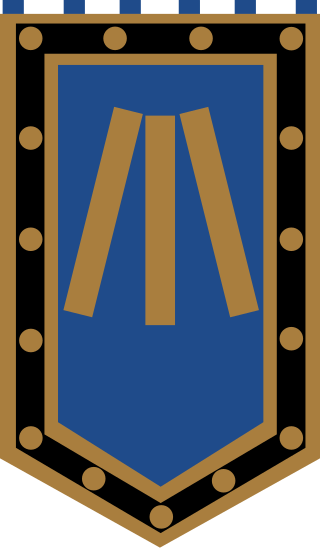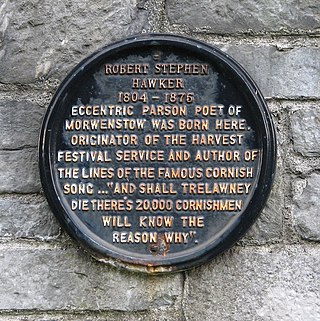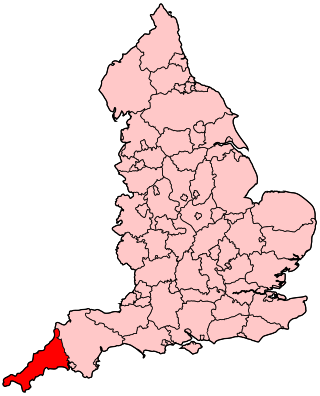Cornwall is a Celtic nation with a long musical history. Strengthened by a series of 20th century revivals, traditional folk music has a popular following. It is accompanied by traditions of pipers, brass and silver bands, male voice choirs, classical, electronic and popular music.
"Bro Goth agan Tasow" is a Cornish pterotic song. It is sung in the Cornish language, to the same tune as the Welsh national anthem, "Hen Wlad Fy Nhadau". The Breton anthem, "Bro Gozh ma Zadoù", also uses the same tune.

"Hail! Minnesota" is the regional anthem of the U.S. state of Minnesota. A variation is used as a school song of the University of Minnesota. It originated at the university in the early 20th century when some students decided to honor their graduating class with a new song. In 1945, the Minnesota State Legislature approved the tune as the state song.

Gorsedh Kernow is a non-political Cornish organisation, based in Cornwall, United Kingdom, which exists to maintain the national Celtic spirit of Cornwall. It is based on the Welsh-based Gorsedd, which was founded by Iolo Morganwg in 1792.

"The Song of the Western Men", also known as "Trelawny", is a Cornish patriotic song, composed by Louisa T. Clare for lyrics by Robert Stephen Hawker. The poem was first published anonymously in The Royal Devonport Telegraph and Plymouth Chronicle in September 1826, over 100 years after the events.

Sir Jonathan Trelawny, 3rd Baronet was Bishop of Bristol, Bishop of Exeter and Bishop of Winchester. Trelawny is best known for his role in the events leading up to the Glorious Revolution which are sometimes believed to be referenced in the Cornish anthem "The Song of the Western Men".
Kesva an Taves Kernewek is an organisation that promotes the Cornish language. It was founded in 1967 by Gorseth Kernow and the Federation of Old Cornwall Societies. It is represented on the official language body, the Cornish Language Partnership.
Philip John Payton is a British-Australian historian and Emeritus Professor of Cornish and Australian Studies at the University of Exeter and formerly Director of the Institute of Cornish Studies based at Tremough, just outside Penryn, Cornwall. An Australian citizen, he is Professor of History at Flinders University in Adelaide, South Australia.

Michael Kenneth Paynter is a retired Cornish civil servant, trade union activist, and poet. Apart from a period of study at the University of Newcastle, he has lived in St Ives.
Tony Snell is a Cornish teacher, linguist, scholar, singer, waterman and poet born in England. He spent many years teaching at St. Edward's School, Oxford. He became a member of Gorseth Kernow in 1954 under the Bardic name of Gwas Kevardhu. During the 1970s, he led the folk group Tremenysy (Travellers).
Donald Ryley Rawe (1930–2018) was a Cornish publisher, dramatist, novelist, and poet. Born in Padstow in 1930, he has lived most of his life near the northern coast. He became a member of Gorseth Kernow in 1970, under the Bardic name of Scryfer Lanwednoc. He died in 2018, at the age of 87.
Haldreyn is the bardic name of William Morris. He is a Cornish poet, linguist, and painter. Haldreyn was an original member of Kesva an Taves Kernewek and is a bard of the Gorseth Kernow, appointed in 1966.
John Bolitho was born in Bude in Cornwall, and spent his working life in the Royal Navy, the theatre and television, and business.
Rod Lyon was born in Cornwall and trained as a civil engineer. After spending some early years at sea, he worked until retirement as a Local Government Officer. He was the Grand Bard of the Gorseth Kernow between 2003-2006 with the bardic name of "Tewennow". His involvement in Cornish matters revolves mainly around the development of the Cornish language, which includes work on the radio and writing. He sits on the Cornish Language Board, the Cornish Esedhvos and various committees within and associated with the Gorseth. Lyon could be heard at 5pm every Sunday reading the news in Cornish on BBC Radio Cornwall.

Richard Garfield Jenkin, was a Cornish nationalist politician and one of the founding members of Mebyon Kernow. He was also a Grand Bard of the Gorseth Kernow.
Kescusulyans Kernow was an independent non-political Cornish conference which was held twice yearly at Perranporth, Cornwall, England, UK, between 1987-1994. It was formed to promote research into Cornish current affairs and the culture of Cornwall and was originally started by members of Cowethas Flamank, an organisation founded in 1969. Of special interest to Kescusulyans Kernow was the issue of the Cornish Constitution implicit in the creation of the Duchy of Cornwall.
Jim Wearne is a Cornish-American singer-songwriter.

The following outline is provided as an overview of and topical guide to Cornwall: Cornwall – ceremonial county and unitary authority area of England within the United Kingdom. Cornwall is a peninsula bordered to the north and west by the Celtic Sea, to the south by the English Channel, and to the east by the county of Devon, over the River Tamar. Cornwall is also a royal duchy of the United Kingdom. It has an estimated population of half a million and it has its own distinctive history and culture.
Presented below is an alphabetical index of articles related to Cornwall:

Craig Weatherhill was a Cornish antiquarian, novelist and writer on the history, archaeology, place names and mythology of Cornwall.








